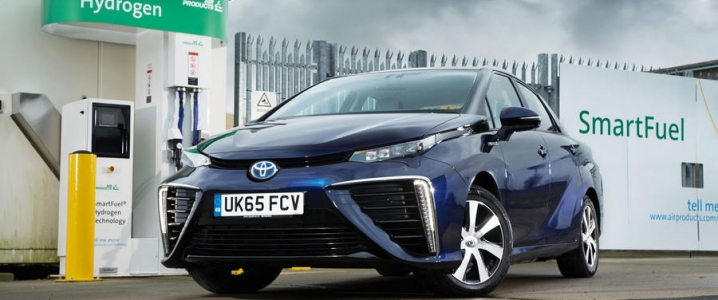Battery-powered electric vehicles have been stealing the spotlight from fuel cell vehicle technology, despite the fact that the latter has been around for a decade or two longer than battery EVs.
Fuel cell vehicles are powered by the most abundant element in the Universe and the Solar System—hydrogen. But technology costs and the handling of hydrogen, as well as high upfront investment costs for hydrogen station infrastructure, have been the major roadblocks to hydrogen-powered cars.
Now the global race to reduce carbon emissions and use sustainable energy has rekindled the debate on whether fuel cell electric vehicles (FCEVs) can carve out a niche in the ‘green mobility’ market and overcome the cost and scale challenges to become a player in the energy transition.
In recent years, many hydrogen energy initiatives and projects have emerged. Legacy automakers have unveiled hydrogen-powered cars and concept vehicles. An oil major has launched a project to install an electrolyser to produce hydrogen at one of its refinery complexes. There are government and global CEO initiatives that support hydrogen energy and hydrogen-powered vehicles to become a meaningful part of the energy transition.
Energy storage and clean fuel company ITM Power partnered last year with Shell for a joint project to install a 10-MW electrolyser to produce hydrogen at the Wesseling refinery site within the Rheinland Refinery Complex in Germany. The two companies also teamed up earlier this year to open a hydrogen fueling station at one of the UK’s busiest service stations.
ITM Power is also a partner in the Surf’N’Turf project in Orkney, a group of islands off the northeastern coast of Scotland. The project, which has the financial support of the European Commission and Scottish authorities, uses surplus electricity produced from tidal and wind power and converts it into hydrogen by splitting water. The compressed hydrogen is transported by ship to a fuel cell in Kirkwall where it makes electricity on demand. Related: Mexico’s New President Has The Energy Sector On Edge
With abundant tidal and wind resources, the potential for renewable hydrogen production in Scotland is huge, and Scotland can and must do more in hydrogen energy production, energy consultant Dick Winchester writes for Energy Voice.
Hydrogen technology for vehicles is another area in which the Universe’s most abundant element can help the energy transition.
Fuel cell vehicles have more range and refill faster than charging a battery EVs (BEVs), but FCEVs and related technology and infrastructure is more expensive than battery-powered ones.
Still, automotive companies have not ruled out fuel cell technology as unviable and are still working on FCEVs.
According to KPMG’s Global Automotive Executive Survey 2018, “Fuel cell electric vehicles have replaced battery electric vehicles as this year’s #1 key trend until 2025.”
According to more than 900 automotive executives surveyed, there will not be a single solitary drivetrain technology by 2040—executives project an almost even split by 2040: BEVs at 26 percent, FCEVs at 25 percent, internal combustion engine (ICEs) at 25 percent, and hybrids at 24 percent.
And carmakers have not given up on fuel cell technology.
Mercedes-Benz unveiled this week its Concept Sprinter F-CELL van, which can open opportunities for commercial use.
“The potential of this technology is undisputed. That applies above all to comparatively large vans with a need for long range and short refuelling times,” said Volker Mornhinweg, Head of Mercedes-Benz Vans.
Japan’s Toyota said in May that it is expanding mass production of fuel cell stacks and of high-pressure hydrogen tanks as it aims for annual sales of FCEVs to top 30,000 units globally from around 2020. Toyota—which launched a mass-produced fuel cell sedan, the Mirai, in December 2014—plans to expand its FCEV product range and to continue to look for ways to reduce cost. Related: Taiwan Doubles Down On U.S. LNG
Under a deal with Seven-Eleven Japan, Toyota also plans to use a newly developed small fuel cell truck in Seven-Eleven’s distribution process.
Hyundai Motor and Audi said last month that they had struck a multi-year patent cross-licensing agreement, covering a broad range of FCEV components and technologies.
Beyond passenger and commercial vehicles, there’s even an ambitious project for a world’s first hydrogen fuel cell technology in a passenger ferry, in the United States.
Globally, cost and scale issues must be overcome if hydrogen is to enable cleaner energy generation and cleaner transportation. The Hydrogen Council—an industry-led effort to develop the hydrogen economy—says that hydrogen could meet 18 percent of the world’s final energy demand in 2050, if governments, industry, and investors increase and coordinate efforts to remove cost and scale barriers.
By Tsvetana Paraskova for Oilprice.com
More Top Reads From Oilprice.com:
- The New Oil Cartel Threatening OPEC
- Qatar Is Poised To Win Race For New LNG Projects
- The Netherlands Can’t Afford To Keep Its Natural Gas Promise



















Currently
energy source > disassociating water > hydrogen > compress > pipeline > storage > vehicle > fuel cell > motor and propulsion.
Every one of those steps involves some or considerable energy loss.